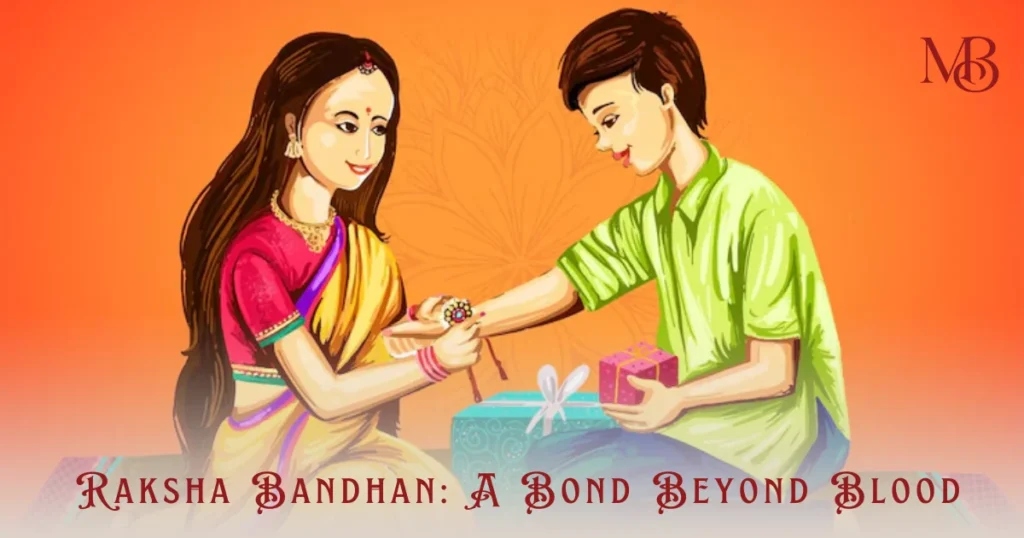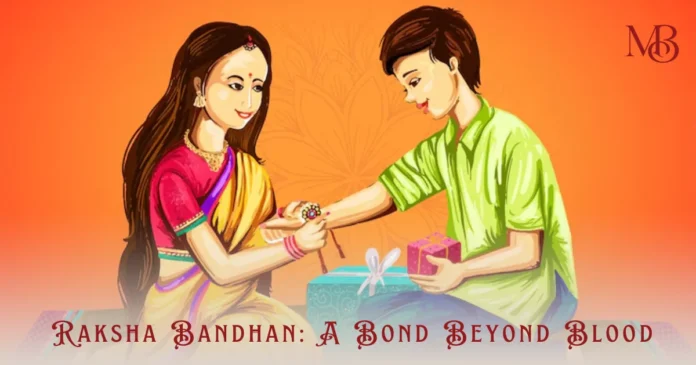Raksha Bandhan, a festival celebrated with great enthusiasm across India, is a beautiful testament to the unbreakable bond between siblings. It is a day when sisters tie a sacred thread, called a Rakhi, on their brothers’ wrists, symbolizing their love, protection, and prayers for their well-being. In return, brothers pledge to protect their sisters from any harm.

The Significance of Raksha Bandhan
Raksha Bandhan, a vibrant festival celebrated across India and other parts of South Asia, is a testament to the enduring power of love, protection, and familial bonds. Its roots can be traced back to ancient Indian mythology, where captivating legends have shaped the festival’s significance.
History of Raksha Bandhan
One of the most beloved tales associated with Rakshabandhan is the story of Indra and Indrani. Indra, the king of gods, faced a formidable enemy in a fierce battle. As the conflict raged on, Indra sustained severe injuries. Witnessing her husband’s pain, Indrani, the queen of gods, was filled with anguish. Determined to protect her beloved, she tied a piece of her sacred cloth around his wrist. This selfless love and protection act is believed to have given birth to the tradition of Rakshabandhan.
Beyond mythology, Raksha Bandhan holds immense cultural and social significance. It serves as a cherished occasion to celebrate the unwavering bond between siblings. Sisters lovingly tie a sacred thread, known as a Rakhi, around their brothers’ wrists, symbolizing their love, trust, and prayers for their well-being. In return, the brothers promise to protect and care for their sisters throughout their lives.
However, the festival transcends the boundaries of blood relations. The spirit of Rakshabandhan extends to close friends, cousins, mentors, and even neighbors. This practice, known as “Rakhi Milan,” fosters a sense of belonging, unity, and community. By exchanging Rakhis, individuals acknowledge and celebrate the unique and special relationships in their lives, creating an unbreakable bond of love and support.
In contemporary times, Raksha Bandhan has evolved into a joyous celebration that brings families and communities together. Elaborate rituals, traditional sweets, and heartfelt wishes add to the festive atmosphere. The festival serves as a reminder of the importance of family, unity, and the unwavering love between siblings.
As the world continues to evolve, the significance of Rakshabandhan remains unchanged. It stands as a timeless testament to the enduring power of love, protection, and the unbreakable bonds that unite us.
The Rituals and Traditions
The Raksha Bandhan ceremony is a simple yet profound ritual. Sisters apply tilak on their brothers’ foreheads, perform aarti, and then tie the Rakhi on their wrists. The brother, in turn, gives gifts to his sister as a token of his love and appreciation. Sweets and delicacies are shared, adding to the festive atmosphere.
In many parts of India, Raksha Bandhan is celebrated with unique customs and traditions. For instance, in some regions, the festival is marked by elaborate puja ceremonies, while in others, it is a more intimate affair celebrated within the family.
Regional Variations of Raksha Bandhan
India’s diverse cultural tapestry is beautifully reflected in the myriad ways Raksha Bandhan is celebrated across the country. Let’s explore some of the unique regional traditions:
Western India: Nariyal Purnima
In coastal states like Maharashtra and Gujarat, Raksha Bandhan coincides with Nariyal Purnima, a festival dedicated to the sea god Varuna. People offer coconuts to the sea as a symbol of gratitude and protection. Fishermen, in particular, hold special prayers and rituals to ensure a safe and bountiful fishing season. This blend of religious fervor and sibling love creates a unique charm to the festival.
Eastern India: Jhulan Purnima
In West Bengal, Raksha Bandhan is synonymous with Jhulan Purnima. This day is marked by the swinging of idols of Radha and Krishna. People decorate swings with flowers and offer prayers to the divine couple. The festival is filled with music, dance, and joyous celebrations, adding a touch of romance to the sibling bond.
Southern India: Avani Avittam
In the southern states, Raksha Bandhan is known as Avani Avittam. While it primarily holds significance for the Brahmin community, it is also celebrated by others. The day is dedicated to changing the sacred thread (yagnopavitam) worn by men. It is a spiritually significant day, emphasizing the importance of purity and knowledge.
Northern India: Traditional Raksha Bandhan
While the core rituals remain similar across North India, the festive spirit varies from region to region. In Punjab, for instance, Raksha Bandhan is often celebrated with kite flying, adding an adventurous element to the day. In Rajasthan, the tradition of Lumba Rakhi stands out, where sisters tie Rakhis to their sisters-in-law, signifying a strong bond between the women of the family.
Central India: Kajari Purnima
In the central region, Raksha Bandhan is celebrated as Kajari Purnima. It holds special significance for farmers as it marks the beginning of the sowing season. The festival is filled with folk songs, dances, and traditional attire.
These are just a few examples of the diverse ways Raksha Bandhan is celebrated across India. Each region adds its unique flavor to the festival, making it a truly enriching experience.
Raksha Bandhan in Modern Times
While the essence of Raksha Bandhan remains unchanged, the festival has evolved with the changing times. Today, Raksha Bandhan is not just confined to traditional rituals; it has become a platform to express love and gratitude in diverse forms.
Sisters and brothers, living far apart, celebrate the festival through video calls, and sending Rakhis and gifts online. The festival has also become an occasion to raise awareness about social issues and promote gender equality. Many organizations use Raksha Bandhan as a platform to empower women and promote the rights of girls.
Beyond the Festival
Raksha Bandhan is more than just a one-day celebration. It is a reminder of the lifelong bond between siblings, a bond that transcends time, distance, and circumstances. The values of love, protection, and care, embodied in the festival, should be cherished and nurtured throughout the year.
It is essential to remember that the spirit of Raksha Bandhan extends beyond biological siblings. It encompasses the broader concept of brotherhood and sisterhood, fostering a sense of community and harmony. By embracing the true essence of Raksha Bandhan, we can create a world where love, respect, and compassion prevail.
You might also like: 10 Strange Traditions Around the World
As we celebrate Raksha Bandhan, let us take a moment to appreciate the invaluable relationship we share with our siblings. Let us strengthen our bonds, express our gratitude, and create lasting memories. Happy Raksha Bandhan! For more such interesting insights, follow our culture page.


